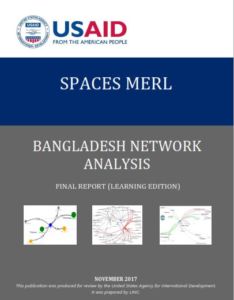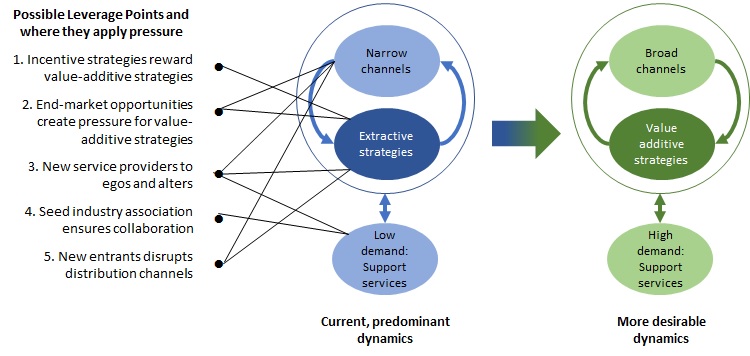SPACES demonstrates the powers of network analysis to inform ongoing programmatic decision-making in Bangladesh. Read the full report here.
The Idea: Network analysis can be utilized efficiently and cost effectively to inform ongoing program decision-making, flagging promising innovations for scale-up or scale-back.

The Background: In 2017 LINC assisted the USAID-funded Bangladesh Rice and Diversified Crops (RDC) to utilize network analysis for program decision-making. Our challenge was to develop a network analysis tool that could be easily understood, transferred and utilized by project managers, while still generating meaningful insights to inform adaptive programming strategy over the course of the RDC project. We achieved this through utilization of a hybrid “Egonet” approach, conducted with grantees of the RDC program in multiple iterations. Our work proved insightful, both in terms of what it taught us about RDC grantee relationships, and the Egonet tool itself. The RDC project is now in the process of utilizing the network analysis tool as a central pillar of its monitoring and evaluation system, an important test of the efficacy of the tool in the context of adaptive management.
The Evidence (so far): The egonet tool was particularly useful in identifying structural dynamics and social norms and biases in the system. Unlike other approaches that predominate in the market systems space, the egonet approach lends the capability of visualizing and quantifying structure and relationships strength. As opposed to a whole network survey, it is also manageable from both a time and resource perspective. Potential for integrating the tool into adaptive MEL processes is high, given some additional streamlining of data collection modalities with RDC going forward. Marrying quantitative and qualitative approaches is essential to providing ego analysis with insights on the overall framework and structure of the system.

Specific structural dynamics uncovered by the tool included:
- Gaps in relations with service providers
- Weak coordination between seed companies and research institutes
- Narrow distribution and supply channels
Social norms and biases uncovered included:
- Lack of growth among suppliers and distributors
- Lead firms expressing desire for trading partners to adopt more value-add strategies
- Lead firms more satisfied with larger suppliers and dristributors
The analysis went further to identify and explain some promising leverage points, revealing that the supply and distribution channels of lead firms are predominantly narrow, and businesses largely engage in extractive strategies. As a result, our analysis recommends five potential leverage points that the RDC project may address to promote this shift, illustrated the graphic at right and explained further in our final report.
This research and development activity is funded through the United States Agency For International Development (USAID) / Global Development Lab “Strategic Program for Analyzing Complexity and Evaluating Systems” (SPACES MERL) activity. The SPACES activity develops and tests tools and approaches for analyzing complex systems and improving intervention performance. SPACES is a collaboration between Johns Hopkins University’s Global Obesity Prevention Center (GOPC), LINC, Resilient Africa Network (RAN) and Global Knowledge Initiative (GKI).
